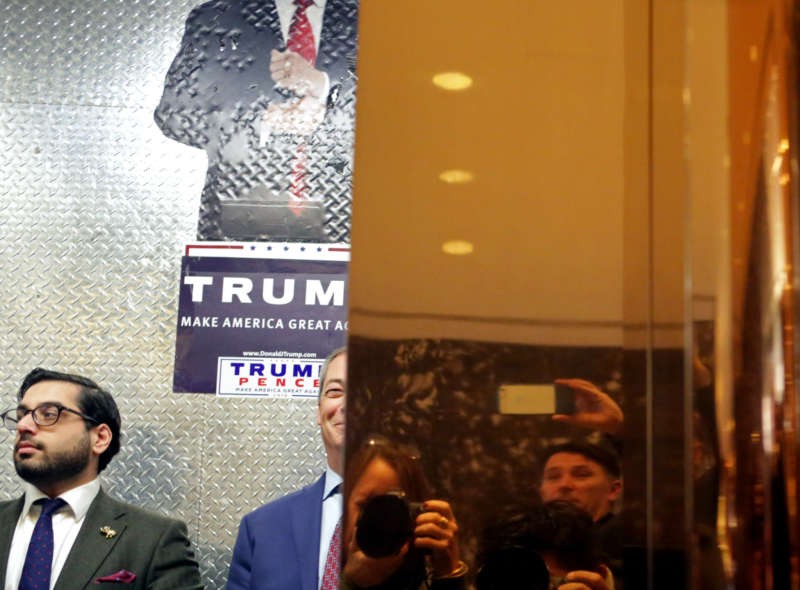
When the British voted to leave the European Union on June 23, I assumed that the meaning and ramifications of this historic decision would be a topic unchallenged in the chatterings of the Westminster village for months, probably years. I was wrong.
Since the early hours of Nov. 9, the political class in this country has been mesmerized by Donald J. Trump’s election, and what it signifies. Brexit remains the inescapable backdrop, an often dreary legal and administrative process that is now the subject of a rancorous court case. But the main event is elsewhere: In the corridors of Westminster, the president-elect’s victory and his plans are virtually all that ministers and members of Parliament want to talk about.
There are structural and historical reasons for this. It is often said that when America sneezes, Britain catches a cold. The two nations have long been intimately connected by language, culture, commercial ties and a strong security alliance. When an American president is elected, the British prime minister of the day is naturally reminded of the bonds between Roosevelt and Churchill, Reagan and Thatcher, and — less auspiciously, some would say — George W. Bush and Tony Blair.
Even Barack Obama and David Cameron, despite disagreements, still celebrated the “essential relationship.” So it is a political reflex for Theresa May to extend the hand of friendship to Mr. Trump and encourage vigorous diplomacy with the incoming administration.
In private, however, her ministers and advisers are anxious about what lies ahead. For all the warm words that Mrs. May and Mr. Trump shared in their phone call on Nov. 10, the differences between them are elemental and cannot be papered over by polite language, banquets and pageantry.
The foundation of Britain’s defense policy remains its commitment to NATO. Does the president-elect share this position and all it entails? Likewise, his curious bromance with Russia’s president, Vladimir V. Putin, dismays those in Britain who fervently believe Russia must be contained.
No less alarming to British politicians are Mr. Trump’s protectionist instincts and his radical lurch away from free-trade orthodoxy. The British economy is already imperiled by the uncertainty of Brexit. A global trade war is the last thing Philip Hammond, the chancellor of the Exchequer, needs.
Drill down into the tectonic plates of British political opinion and you will find more fundamental trepidation. Some have persuaded themselves that being in office brings “normalization,” and that Mr. Trump’s vile campaign language was mere shtick. But the appointments made to date, especially the choice of Stephen K. Bannon as the president-elect’s chief strategist, have scarcely supported this complacent thesis.
What ministers truly fear is that Mr. Trump was right when he predicted that his election would be “Brexit plus plus plus.” They fret that his victory and Britain’s referendum are linked symptoms of a deep fracture in the global democratic order, signaling a malfunction in the free world’s traditional political machinery. In both votes, immigration and race clearly played a central part, as did the conviction of many white voters that they were being left behind by globalization and the supposedly preferential treatment of minorities.
Britain does not yet have a developed alt-right, as America’s white nationalist movement calls itself. But the germ of that political current can be detected in the digital nexus between the U.K. Independence Party, which has long campaigned against “mass immigration” and for Britain to leave the European Union, and sites like Breitbart and nationalists on social media.
The Independence Party’s interim leader, Nigel Farage, was the first British politician to meet Mr. Trump after his victory — an astonishing breach of diplomatic protocol that highlighted Mr. Farage’s spurious claim to be our man in the new Washington. That claim will fade soon enough, though Mr. Trump’s tweeted endorsement of Mr. Farage for the ambassadorship has infuriated Mrs. May’s government. What did the welcome for a maverick like Mr. Farage portend?
Even before the American election, Mrs. May had identified the discontents of globalization as a priority. In a speech this month, she conceded that “we have on occasion overlooked the impact on those closer to home who see these forces in a different light,” and she promised to look after those who “see their jobs being outsourced and wages undercut.”
While Mr. Trump seems to prefer the demagogue’s methods (putting up walls, tearing down trade deals), Mrs. May presents herself as a reformer. Her approach — free trade, labor migration and global interdependence — is the right one, but it is a hard path.
Promoting education, science and technology may, in the long term, yield a British work force better suited to the buffeting winds of globalization. But there is a dawning realization in Britain, sharpened by Mr. Trump’s victory, that there will still be many who are left behind by automation, the international movement of labor and the pace of change. What will these people do all day, and what can government do to help them?
The scale of such questions is breathtaking. There have long been rumblings against the inequities of global trade, not least in the form of the Occupy movement. Despite this growing groundswell, from the end of the Cold War in 1989 to just now, in 2016, it remained orthodox for mainstream politicians to embrace the emerging global market without reservation as the engine of growth that it was and still is.
No longer. The defects of the liberal global order have finally come back to bite its political tribunes. Which is why so many British ministers seem so fretful as they pace the halls of Westminster. Mr. Trump’s victory has forced them to confront a horrible truth: Whatever they thought they knew before, from now on, anything is possible.
Matthew d’Ancona is a political columnist for The Guardian and The Evening Standard and a contributing opinion writer.
